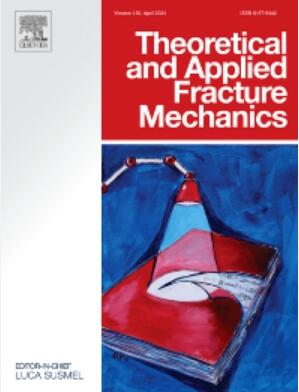A closed form expression of stress intensity factor for an arbitrarily shaped planar crack in 3-D under tensile loading
IF 5
2区 工程技术
Q1 ENGINEERING, MECHANICAL
引用次数: 0
Abstract
A closed-form equation was developed in this work to quantify the stress intensity factor (SIF) along an arbitrarily shaped planar crack under mode-I loading by substituting the ellipse-related parameters in Irwin’s solution with geometry-related parameters of the crack. This allowed incorporation of the local crack curvature effect on SIF at each discrete point along the crack front and its relative weighted contribution to SIF of the neighboring crack point i, where either stress concentration or shielding took place, into computation of the SIF distribution along the crack front. Good agreement was obtained between the values derived in the current work and previous numerical simulation-based studies. The current method could capture the distributions for surface and embedded cracks having the same shape, with their maximum values being consistent with Murakami’s method. This solution of allows for highly efficient calculation of for quantification of the 3D growth behaviors of a fatigue crack with a complex shape, paving the way for studying the statistical nature of short fatigue crack growth.
拉伸荷载下任意形状平面裂缝的三维应力强度因子闭式表达式
通过用裂纹的几何相关参数 fi 代替 Irwin 解法中的椭圆相关参数,本文建立了一个闭式方程,用于量化模态 I 加载下沿任意形状平面裂纹的应力强度因子 (SIF)。这样,在计算沿裂纹前沿的 SIF 分布时,就可以考虑到局部裂纹曲率对裂纹前沿每个离散点的 SIF 的影响,以及其对相邻裂纹点 i 的 SIF 的相对加权贡献(在相邻裂纹点 i 上发生应力集中或屏蔽)。当前研究得出的 KI 值与之前基于数值模拟的研究结果非常吻合。目前的方法可以捕捉到具有相同形状的表面裂缝和嵌入裂缝的 KI 分布,其最大值与 Murakami 的面积法一致。这种 KI 解法可高效计算 ΔKI 值,用于量化形状复杂的疲劳裂纹的三维生长行为,为研究短疲劳裂纹生长的统计性质铺平了道路。
本文章由计算机程序翻译,如有差异,请以英文原文为准。
求助全文
约1分钟内获得全文
求助全文
来源期刊

Theoretical and Applied Fracture Mechanics
工程技术-工程:机械
CiteScore
8.40
自引率
18.90%
发文量
435
审稿时长
37 days
期刊介绍:
Theoretical and Applied Fracture Mechanics'' aims & scopes have been re-designed to cover both the theoretical, applied, and numerical aspects associated with those cracking related phenomena taking place, at a micro-, meso-, and macroscopic level, in materials/components/structures of any kind.
The journal aims to cover the cracking/mechanical behaviour of materials/components/structures in those situations involving both time-independent and time-dependent system of external forces/moments (such as, for instance, quasi-static, impulsive, impact, blasting, creep, contact, and fatigue loading). Since, under the above circumstances, the mechanical behaviour of cracked materials/components/structures is also affected by the environmental conditions, the journal would consider also those theoretical/experimental research works investigating the effect of external variables such as, for instance, the effect of corrosive environments as well as of high/low-temperature.
 求助内容:
求助内容: 应助结果提醒方式:
应助结果提醒方式:


